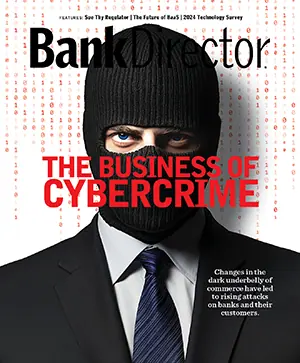John Engen is a contributing writer for Bank Director. He has more than 30 years of experience as a business journalist, writing for a variety of newspapers and magazines, and was a foreign correspondent for the Associated Press. He graduated with a degree in economics and international relations from the University of Minnesota and did his post-graduate work in Asian studies at the University of Hawai’i.

Magazine Exclusive: A Conversation with Peter Crist
A director on the board of Wintrust Financial Corp. talks about why he thinks CFOs can make great CEOs.
*The following feature appears in the fourth quarter 2024 edition of Bank Director magazine. It and other stories are available to magazine subscribers and members of Bank Director’s Bank Services Program. Learn more about subscribing here.
When Peter Crist was asked to join the board of Rosemont, Illinois-based Wintrust Financial Corp. in 1996, one thing that attracted him was the background of its then-CEO, Edward Wehmer: He had been a chief financial officer. Crist, who served as the $60 billion bank’s chairman from 2008 to 2017 and today is chairman of its nominating and corporate governance committee, is also chairman of CristKolder Associates, a Chicago executive search firm. He thinks CFOs often make the best bank CEOs. He recently talked with Bank Director magazine about why. This interview has been edited for length and clarity.
Ed Wehmer’s background as a CFO was important to you. Why?
Ed is whip-smart, and I love CFOs who become CEOs in the banking space, if they’re good leaders. They understand the balance sheet and the financials cold, and usually can apply that knowledge to the enterprise and the marketplace in a very effective way.
Why do you think that is?
If you’re a CFO, you’re very accustomed to two things. First, you understand what investors want, and second, you understand what makes a good deal. It takes real dialogue and sensitivity beforehand for both sides to win. A CFO instinctively understands that nuance and what it takes to get a deal done. That’s very important, especially in banking.
Is that something CFOs are born with, or is it learned?
It’s more of a toolkit that’s developed. Every leader starts with a certain career DNA. In technology, the DNA is often software, engineering or something else related to tech. Your toolkit is developed in your mid-career years; it’s an accumulation of experiences. If you’re in finance and pursue the CFO route, your toolkit eventually includes M&A, talking to investors, overseeing strategy, operational finance, financial planning and analysis, divestitures and running businesses.
Those sound like good qualities for a CEO to have.
It’s no accident that many of banking’s best CEOs have come up the finance side and at some point have been CFOs. [JPMorgan Chase & Co. CEO] Jamie Dimon was a CFO. Andy Cecere at U.S. Bancorp was a CFO. Bill Demchak at The PNC Financial Services Group was a CFO.
Were there situations at Wintrust where you saw Ed Wehmer’s background as a CFO helping him as CEO?
Wintrust is highly acquisitive. Our finance committee regularly considered a variety of potential deals, and Ed’s ability to value a prospective opportunity was clear. You always could see how he got to his number. His pragmatism kept us out of any number of deals that appeared to be attractive but really weren’t. We’ve made close to 30 deals, and Ed’s clarity of thought always held up. It was that CFO DNA coming to the fore.
It sounds like being CFO is almost an audition for CEO?
I don’t know if I’d call it auditioning, since I know plenty of CFOs who would rather partner with a great CEO than take the heat themselves in the big chair. But that doesn’t mean they’re not prepared. Think of the analogy of using an anvil to make a sword: The metal is being beaten every day. The CFO is being prepared under fire to be the CEO. They have to choose to pursue the CEO role though, and some just don’t.
Any other notable aspects that help CFOs elevate to the next level?
Anecdotally, there’s a real benefit to the CFO being in the room with the board four or five times a year. Human nature being what it is, as a director I get comfortable with you. Board members can see you’re smart, and you learn how to deliver news. You have to be transparent. That’s a great advantage for a CFO that aspires to become a CEO. And those strong communication skills at the board level translate well to internal messaging. As you can imagine, most great leaders are great communicators.


